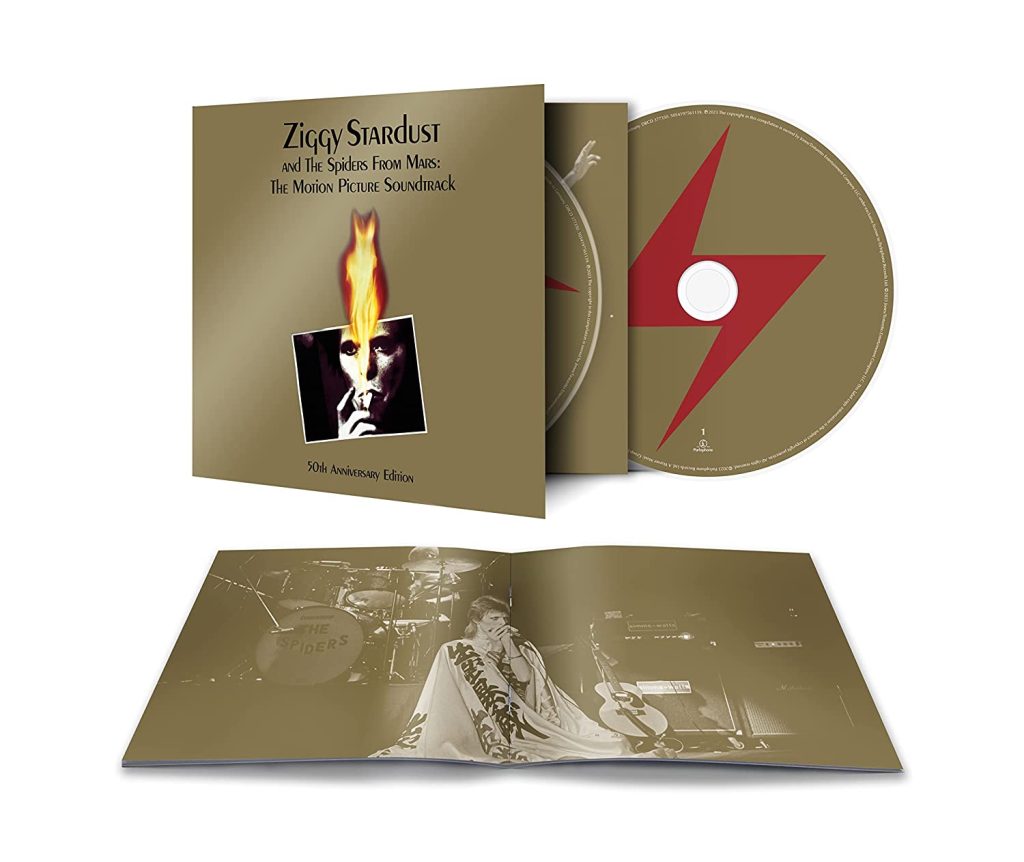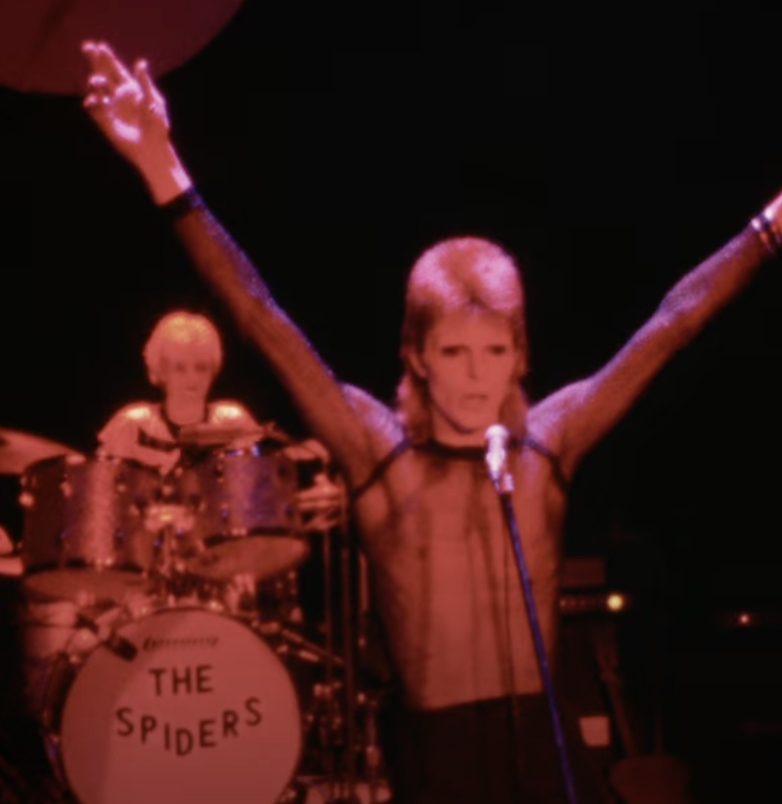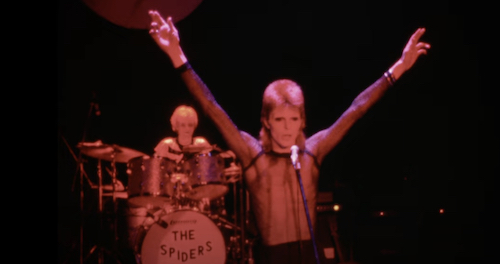 Anyone who doubted early on that David Bowie was on the road to superstardom probably hadn’t witnessed his July 3, 1973, show at London’s Hammersmith Odeon. It’s notable not just because he exudes supreme self-confidence while skillfully delivering a concert that’s pretty far off the beaten path in terms of style and content; also memorable are the expressions on the faces of many of his 5,000 rapt audience members, who seem overcome with emotion to the point where they look as if they’re either having orgasms or are on the verge of nervous breakdowns.
Anyone who doubted early on that David Bowie was on the road to superstardom probably hadn’t witnessed his July 3, 1973, show at London’s Hammersmith Odeon. It’s notable not just because he exudes supreme self-confidence while skillfully delivering a concert that’s pretty far off the beaten path in terms of style and content; also memorable are the expressions on the faces of many of his 5,000 rapt audience members, who seem overcome with emotion to the point where they look as if they’re either having orgasms or are on the verge of nervous breakdowns.
You can see for yourself in a concert film called Ziggy Stardust and the Spiders from Mars from the late director D.A. Pennebaker (Dont Look Back, Monterey Pop). An abbreviated version of the movie showed up on TV as early as 1974, and it has also previously been issued theatrically and on DVD. But a 2023 50th-anniversary Blu-ray edition delivers the complete movie for the first time, with restored video by Pennebaker’s son Frazer and remastered DTS-HD Master surround sound (though of course, given the film’s age, no widescreen). The video comes packaged with the soundtrack on two CDs and a 24-page booklet with 2002 notes from the director, as well as new commentary from his son, his widow and British music journalist Charles Shaar Murray.

Related: Our Album Rewind of the original Ziggy LP
It’s quite a show—and quite a film, as well. Pennebaker and his crew avoid the constant shifts in perspective that mar many concert movies, instead focusing for long periods directly on Bowie and guitarist Mick Ronson. The film begins with brief scenes of fans outside the venue and of Bowie in his dressing room, having makeup applied and visiting with his wife at the time, Angela.
Then he goes onstage and gets down to business, opening an approximately hour-and-a-half set with “Hang on to Yourself” and “Ziggy Stardust” from 1972’s The Rise and Fall of Ziggy Stardust and the Spiders from Mars, which is also the source for the show’s “Moonage Daydream,” “Rock ’n’ Roll Suicide” and “Suffragette City.”
Additionally featured are the title track and “Wild-Eyed Boy from Freecloud” from 1969’s Space Oddity; “The Width of a Circle” from 1970’s The Man Who Sold the World; “Oh, You Pretty Things” and “Changes” from 1971’s Hunky Dory; and “Watch That Man,” “Cracked Actor,” “Time” and “The Jean Genie” from the then brand-new Aladdin Sane. (That last number includes a snippet from the Beatles’ “Love Me Do” that incorporates terrific harmonica work by Bowie.) In addition, he offers a brief rendition of “All the Young Dudes,” which he wrote for Mott the Hoople, and covers Lou Reed’s “White Light/White Heat,” Chuck Berry’s “Round and Round,” the Rolling Stones’ “Let’s Spend the Night Together” and Jacques Brel’s “My Death.”
Audio versions of all these performances were offered in the 2015 boxed set Five Years 1969-1973 with the notable exception of the “Jean Genie”/“Love Me Do” medley and the Berry cover, both of which feature incendiary guitar work by guest Jeff Beck. (The medley has not previously been released anywhere.)
This is Bowie’s most androgynous and theatrical phase, so there are lots of glam-rock affectations, including multiple changes into outrageous costumes. Given their appearance, it’s not hard to imagine that the singer and his band, the Spiders from Mars, could in fact be extraterrestrials. But unlike some rock groups of this era, this one doesn’t use its over-the-top theatrics to mask a lack of musical talent. Bowie’s songs and performances consistently impress and so does his band—especially Ronson, whose guitar pyrotechnics on extended numbers like “The Width of a Circle” are often spectacular.
Much has been made of Bowie’s so-called “farewell speech” near the end of the Ziggy Stardust film, where he announces that “not only is it the last show of the tour, but it’s the last show that we’ll ever do.” That supposedly shocking statement—which is actually hinted at earlier, when an MC introduces the band by saying, “For the last time…David Bowie!”—is not as big a deal as it may have seemed, however. While Bowie makes it sound as if he’s waving goodbye to live performance, he in fact means only that he’s retiring the Ziggy Stardust persona. He would continue to perform concerts and even to feature many of the same songs included in this show and would, of course, also go on to scale many other musical heights. So, all he’s doing here is closing the door on one phase of his career. But what a phase it was.

